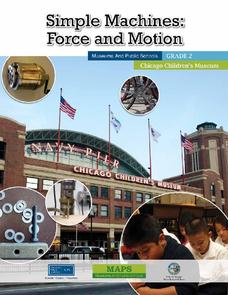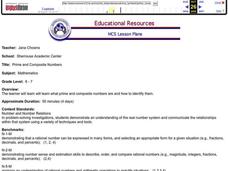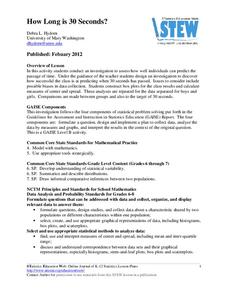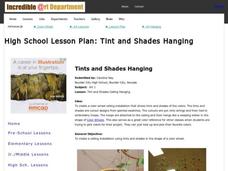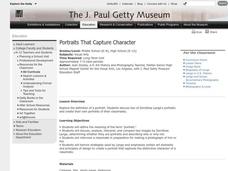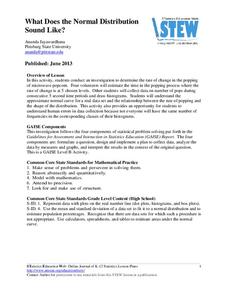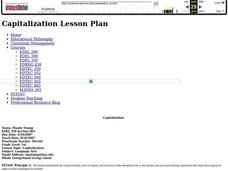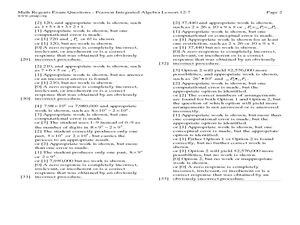Chicago Children's Museum
Simple Machines: Force and Motion
Get things moving with this elementary science unit on simple machines. Through a series of nine lessons including teacher demonstrations, hands-on activities, and science experiments, young scientists learn about forces, motion, and...
It's About Time
A Running Start and Frames of Reference
Ttake learning to the next level! Individuals research inertial mass, a physical property of matter, and apply what they learn through a series of activities designed to stimulate the senses. They demonstrate Galileo's Principle of...
Curated OER
Prime and Composite Numbers
Prime and composite numbers are the focus of this mathematics lesson. In it, learners practice techniques for identifying these two types of numbers. They utilize the Inspiration program to complete a task that is clearly explained, and...
Chymist
Make a Low Energy Radio Transmitter
How do you demonstrate radio transmissions? Pupils build a low-energy radio transmitter by constructing two coils from magnet wire and connecting them to audio/phone plugs. The resource provides the details on how to build the...
American Institute of Architects
Architecture: It's Elementary!—First Grade
Build an interest and appreciation for architecture in your young learners with this fun 10-lesson art unit. Engaging children in using their five senses, the class first observes the environment around them, paying special attention to...
Curated OER
Calculating Simple Interest
Interest can be both a best friend and an enemy...show your learners how it can manifest through this set of 10 word problems. For each, they calculate time, principle, interest, or rate and choose an answer from multiple choice...
American Statistical Association
How Long is 30 Seconds?
Is time on your side? Pupils come up with an experiment to test whether their classmates can guess how long it takes for 30 seconds to elapse. They divide the class data into two groups, create box-and-whisker plots, and analyze the...
Curated OER
Speciation and Genetic Drift Worksheet
Fifteen terms pertaining to speciation, extinction, and gene flow are to be matched to their definitions. This simple, easy-to-read learning exercise can be used as a pop quiz for your biology learners when studying natural selection...
Incredible Art
Tints and Shades Hanging
Here's a mobile assignment that will brighten up your classroom. Each group is assigned one color from the color wheel, paints the pure color, three tints, and three shades of that color on precut forms the group designs, and hangs the...
Channel Islands Film
Island Rotation: Lesson Plan 2
Why are Torrey pines only found in La Jolla, California and on Santa Rosa Island? Class members examine images of Torrey pines from these two locations, noting the similarities and differences, and then develop a demonstration model that...
J. Paul Getty Trust
Portraits That Capture Character
One of the great things about technology is that it lets youngsters visit museums that may be many miles away. With this resource, middle and high schoolers can visit the portrait galleries at J. Paul Getty Museum, located in Los...
Curated OER
Powers of Congress
Have your class fill out this comprehension sheet while reading about the powers of Congress. There are ten multiple choice questions focused on the rights, powers, and limitations of Congressional law.
Curated OER
Note-Taking: K.I.S.S. "Keep It Short and Simple"
Note-taking is an essential study skill, and it needs to be taught! In the context of a research project on energy sources, learners find multiple sources, evaluating, paraphrasing, and citing them correctly. Two lists with note-taking...
Statistics Education Web
What Does the Normal Distribution Sound Like?
Groups collect data describing the number of times a bag of microwave popcorn pops at given intervals. Participants discover that the data fits a normal curve and answer questions based on the distribution of this data.
Curated OER
Capitalization
Teach your class the rules of capitalization with this fun, engaging lesson. Children participate in a learning activity, collaborate with peers, and practice their writing as they learn three specific rules: to always capitalize the...
LABScI
Genetic Equilibrium: Human Diversity
Investigate the Hardy-Weinberg Principle to explain genetic equilibrium. The 10th lesson plan of a series of 12 is a laboratory exploration of genetic equilibrium. Your classes use a mixture of beans to model allele and genotype...
University of Southern California
What's the Catch?
There must be a catch! A comprehensive lesson looks at ocean fishing concerns through a set of five hands-on activities. Learners become aware of the risks of seafood contamination and factors that have affected the ocean environment.
CK-12 Foundation
Development of Theories
Theory or Law? You decide. And so will your class members, in an insightful interactive. Young scientists divide common scientific principles or statements between the two groups, then dig deeper in understanding the functions of...
Curated OER
Electron Arrangement in Atoms
In this electron configuration worksheet, students fill in 10 blanks with the appropriate terms, they determine if 6 statements are true or false, they match 5 terms with their meanings and they answer two questions about electron...
Curated OER
Practice Quiz -Equilibrium
In this equilibrium activity, students solve eight problems including determining the effects of changes to a system as it related to Le Chatelier Principle, calculating equilibrium constants and finding boiling points of solutions.
Curated OER
Permutations and Combinations
In this permutations and combinations activity, students solve 13 word problems. Each problem presents a common situation and asks students to tell the number of possible combinations.
Curated OER
Counting Methods and Permutations
In this algebra worksheet, students rewrite word problems into algebraic expressions and use the multiplication Counting Principle to solve the problems. They solve word problems using Permutations. There are 33 questions with an answer...
Palomar College
Crossword Puzzle for Basic Principles of Genetics
In this genetics learning exercise, learners complete a crossword puzzle by determining the terms associated with the 24 clues given. Students review terms such as phenotype, genotype, alleles, and Mendel.
Curated OER
(Texas) Capitol Visitors Center, Post-Visit Lesson Plan, Grades 7 and 8
Students discuss the importance of commemorative monuments. They review Texas monuments and identify the reasons a monument dedicated to certain events or individuals. They design another Texas monument and explain why they...


